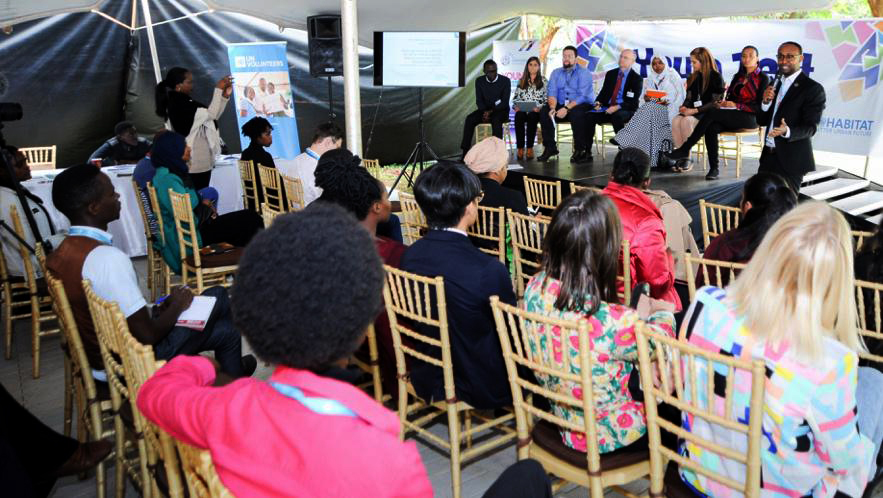and includes young people in processes that hold governments to account for these global commitments."
NAIROBI, May 2019 – While the international community recognises the important and positive role that young people play in maintaining and promoting international peace and security, there are several challenges in measuring progress.
In line with the overall theme of the first UN-Habitat Assembly on Innovation, UN-Habitat hosted a side event to explore innovative approaches, discuss strategies and concrete actions to support the role in measuring the progress on United Nations Security Council Resolution 2250 on Youth, Peace and Security.
Bo Mathiasen, Deputy Director, Division for Policy and Analysis at UN Office on Drugs and Crime, and Lucie Leonard, Public Safety Canada A/Director, Research Division, Community Safety Branch brought up the issue of lacking indicators and data, and how we must be innovative and participatory in gathering data. Mr Mathiasen stated that “governments should be monitored in a way that both captures the experiences and views of youth and includes young people in processes that hold governments to account for these global commitments.”
As part of Colombia’s post-conflict reconciliation and to address general economic challenges, and the large number of youth, the state-organisation called the Colombian National Apprentice Service trains huge numbers of of youth with the help of 3000 trainers, working on training of trainers programmes and adapting to local realities and necessities.
“In post-conflict settings such as Colombia, the current focus on job-creation must be supplemented with soft-skills and tied to public and private-sector opportunities. It must also reach those not easy-to-reach and possibly having foregone a formal education,” said the Service’s Adriana Colmenares Montoya.
This struck a chord with fellow panel members Fatuma Muhumud, UNPFA Programme Analyst-Youth Somalia and João Scarpelini, UN-Youth Advisor in Somali, who stressed the importance of innovation approaches to ensuring young people get a seat at the table when peace processes are being negotiated. Mr Scarpelini highlighted his work in the divided city of Galkayo, in Puntland.
“We started an initiative called Shaah and Skeeko (tea and storytelling) where young people engaged in intergenerational dialogues with elders in the community, ultimately leading to young people getting a seat at the table in negating the Galkayo peace processes."
“Addressing youth should not be a marginalized addition to decision-making processes, it should be an integral part of it due the fact that youth transverses every sector of sustainable development in society” added Sona Jobarteh, UN-Habitat newly proposed Global Ambassador.
In his concluding remarks, Sharmaarke Abdullahi, Programme Management Officer with UN-Habitat called for the inclusion and participation of all members of our society to monitor and implement UNSCR 2250 starting with those furthest from behind. “Young people’s insights, energy and innovations are indispensable to the achievement of this collective vision,” he said.
